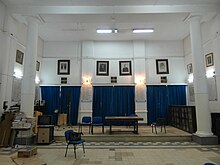This article contains too many pictures for its overall length. |
Έλληνες του Σουδάν | |
|---|---|
 The ceremony hall of the Hellenic Community in Khartoum (2015) | |
| Total population | |
| 150 + unknown number of descendants. | |
| Regions with significant populations | |
| Khartoum, Port Sudan, El Obeid | |
| Languages | |
| Greek · Sudanese Arabic · English | |
| Religion | |
| Greek Orthodox Church, Islam | |
| Related ethnic groups | |
| African Greeks · Egyptian Greeks · Ethiopian Greeks |
The Sudanese Greeks, or Greeks in Sudan, are ethnic Greeks from modern-day Sudan; they are small in number (estimated at around 150 in 2015), but still a very prominent community in the country.[1] Historically, this diverse group has played a significant role in the political, economic, cultural, and sporting life of Sudan,[2] as they have been the only European immigrant community of considerable size and economic power.[3]
Following cultural exchanges in ancient and medieval times, a few hundred Greeks – mostly military officers and traders – settled in the six decades after the 1820 Egyptian-Turkish conquest of what became modern Sudan. About one hundred of them stayed, either forcedly or deliberately, when the Ottoman occupiers were defeated by the local Mahdist forces in 1885. With the establishment of the Anglo-Egyptian Sudan in 1898, Greek merchants, administrators and artisans de facto became the stalwarts of the British-dominated colonial regime. By the time Sudan gained independence in 1956, their numbers had increased to around 6,000-7,000, but soon afterwards decreased, especially after the nationalisation of many businesses in 1969 and the introduction of Sharia law in 1983.
The Greek anthropologist Gerasimos Makris, who is related to the Greeks of Sudan through marriage, stresses that "neutrality and a 'clean hands' ideology has always been central to the Greek settlers' self-image, though it is difficult to be reconciled with political developments".[4] While the members of this community have been "proud for being Greeks 'more than the Greeks of Greece'",[5] he concedes at the same time a hybrid identity, because they, "in the long run, have proven to be culturally and sentimentally surprisingly close to the Sudanese".[4]
- ^ Deckert, Roman; Joerin, Julia (2015). "Der Grexit von Khartum". Zenith (in German). 4.
- ^ Chaldeos, Antonios (2017). "Sudanese toponyms related to Greek entrepreneurial activity". Dotawo: A Journal of Nubian Studies. 4: Art. 1.
- ^ Makris, Gerasimos; Stiansen, Endre (21 April 1998). "Angelo Capato: A Greek Trader in the Sudan" (PDF). Sudan Studies: 10–18.
- ^ a b Makris, Gerasimos (November 2007). "A Prisoner of the Mahdi – Nicolas P. From Samos" (PDF). Sudan Studies. 36: 13–27.
- ^ Papakyriacou, Marios (2014). Formulation and definitions of the Greek national ideology in colonial Egypt (1856–1919). Berlin: Freie Universität Berlin, Fachbereich Geschichts- und Kulturwissenschaften. pp. 31, 63–64, 214, 305, 308.
